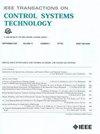Reference-Adaptation Predictive Control Based on a Deep Parallel Model for Piezo-Actuated Stages
IF 3.9
2区 计算机科学
Q1 AUTOMATION & CONTROL SYSTEMS
引用次数: 0
Abstract
The intrinsic hysteresis nonlinearity of piezo-actuated stages (piezo stages) poses a significant challenge for precise trajectory tracking at high speeds. In response, we propose a deep parallel (dPara) model that effectively captures the dynamics of the piezo stage using historical voltage–displacement data over a concise time period. The dPara model, incorporating a parallel combination of a linear block and a feedforward neural network (FNN), exhibits exceptional performance with relative prediction errors ranging between 0.10% and 0.18% on sinusoidal trajectories at frequencies up to 72% of the resonance frequency of the piezo stage. By leveraging this parallel structure, we adapt the reference trajectory for a complex nonlinear model predictive control (MPC), leading to the development of the reference-adaptation MPC (RA-MPC). Furthermore, we design a coordinate ascent algorithm to solve the quadratic programming (QP) problem derived from the RA-MPC at a high frequency of 10 kHz. To assess the superiority of the proposed RA-MPC, comprehensive experiments are conducted under sinusoid, sawtooth, and staircase reference trajectories. Notably, it achieves maximum tracking errors (MTEs) ranging from 0.0263 to基于深度并联模型的参考自适应预测控制
压电驱动级(压电级)的固有迟滞非线性对高速下的精确轨迹跟踪提出了重大挑战。作为回应,我们提出了一种深度并行(dPara)模型,该模型使用简明时间段内的历史电压位移数据有效地捕获压电级的动态。dPara模型结合了线性块和前馈神经网络(FNN)的并行组合,在频率高达压电级共振频率的72%的正弦轨迹上表现出优异的性能,相对预测误差在0.10%到0.18%之间。利用这种并联结构,我们将参考轨迹调整为复杂非线性模型预测控制(MPC),从而导致参考自适应MPC (RA-MPC)的发展。此外,我们设计了一种坐标上升算法来解决由RA-MPC在10 kHz高频下导出的二次规划(QP)问题。为了评估所提出的RA-MPC的优越性,在正弦、锯齿和阶梯参考轨迹下进行了综合实验。值得注意的是,它实现了最大跟踪误差(mte)范围从0.0263到0.7136美元;$ mu $ m用于从$ 40到$ 20,000的期望速度;\mu $ m/s。
本文章由计算机程序翻译,如有差异,请以英文原文为准。
求助全文
约1分钟内获得全文
求助全文
来源期刊

IEEE Transactions on Control Systems Technology
工程技术-工程:电子与电气
CiteScore
10.70
自引率
2.10%
发文量
218
审稿时长
6.7 months
期刊介绍:
The IEEE Transactions on Control Systems Technology publishes high quality technical papers on technological advances in control engineering. The word technology is from the Greek technologia. The modern meaning is a scientific method to achieve a practical purpose. Control Systems Technology includes all aspects of control engineering needed to implement practical control systems, from analysis and design, through simulation and hardware. A primary purpose of the IEEE Transactions on Control Systems Technology is to have an archival publication which will bridge the gap between theory and practice. Papers are published in the IEEE Transactions on Control System Technology which disclose significant new knowledge, exploratory developments, or practical applications in all aspects of technology needed to implement control systems, from analysis and design through simulation, and hardware.
 求助内容:
求助内容: 应助结果提醒方式:
应助结果提醒方式:


